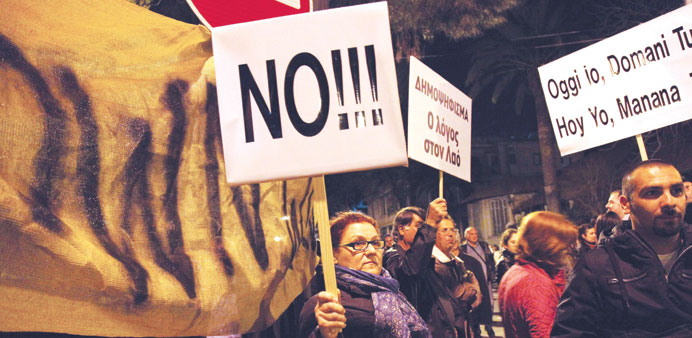|
The Kremlin is outraged at the looming loss of billions of euros from Russian bank accounts held with Cypriot banks, with President Vladimir Putin reacting as though his own money was at stake. |
Analysts believe Moscow’s aim of closer economic ties with the European Union has taken a battering as a result of EU pressure on the Mediterranean island to put its financial affairs in order.
Russia feels it has been steamrollered by the EU, as Finance Minister Anton Siluanov made clear. Moscow is seeing the move as a breach of confidence, especially as Russia has stood by the euro and kept almost 40% of its reserves in the single European currency through the turbulence of recent years.
Putin has repeatedly expressed confidence in the euro. “But now the Europeans are resolving their problems effectively at the expense of Russian assets,” as the Nezavisimaya Gazeta daily put it.
The conflict is a bad omen for a planned meeting between the European Commission and Medvedev in Moscow at the end of the week. Angered at not being consulted on how to deal with the island’s financial crisis, Moscow is now casting doubt on its aid to Nicosia.
This includes credit lines worth more than 2.5bn euros ($3.2bn) at favourable interest rates. Given the changed circumstances, Moscow would have to review its policy, the Russian ambassador to the EU, Vladimir Chizhov, said.
The plan to impose a one-off tax on deposits has hit - alongside island residents - those Russian firms and wealthy individuals who have invested their savings in Cyprus to take advantage of its low company tax rates.
Estimates put the value of Russian funds in Cypriot bank accounts at up to 35bn euros - much of which returns to Russia at some point.
According to the Vedomosti business daily, 40% of foreign direct investment in Russia originates from Cypriot accounts, and there are also billions of euros held there by Russian banks.
Moscow’s media and business people have expressed their anger with terms like “piracy”, Bolshevism,” “holding hostage” and “state-backed robbery”.
There is particular anger at what are seen as EU attempts to attack Russia’s reputation. Brussels had for months been creating the impression that Cyprus was simply a money-laundering centre for Russian criminals, Vedomosti noted.
It is an open secret that Russian tax evaders - including high-ranking politician - have stashed illicit funds on the island, but global companies like Norilsk Nickel also have branches there.
Many companies see the courts on the island, which operate a legal system based on English law, as more neutral than those in Russia, where they stand accused of corruption and of handing down arbitrary rulings.
However, it is possible that Russia could also benefit from the current conflict over the tax through Nicosia providing information on Russian deposits in exchange for help from Moscow.
This would suit the Kremlin, which has for years sought ways to halt the flood of capital leaving Russia. Another possibility is that Gazprom, in which the Russian state has a controlling stake, could secure exploitation rights in the lucrative gas fields thought to lie offshore.
Other state companies are also looking to start infrastructure projects, with Cypriot Finance Minister Michalis Sarris due in Moscow for talks today.
And there have been repeated rumours to the effect that the Russian military has its eye on the strategically placed island in the eastern Mediterranean.
The defence ministry has announced the creation of a permanent rapid reaction force in the region, and the Russian navy is said to be on the lookout for a suitable base. Nicosia has always strenuously denied any interest. - DPA

